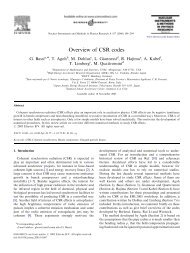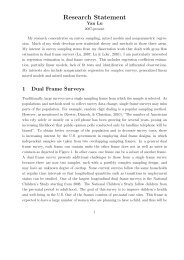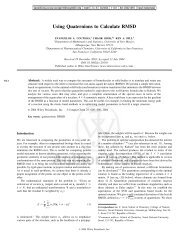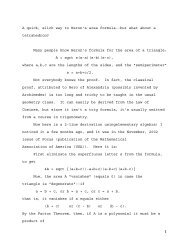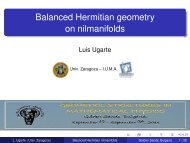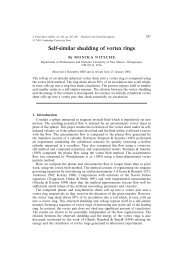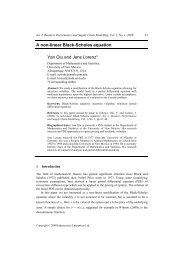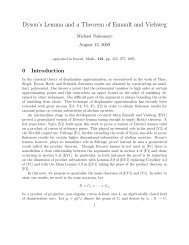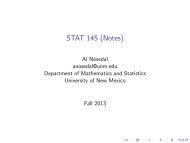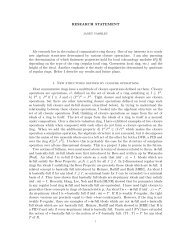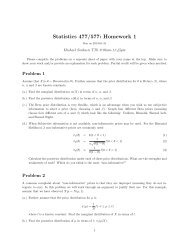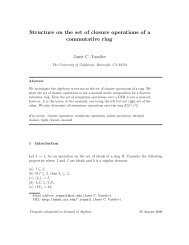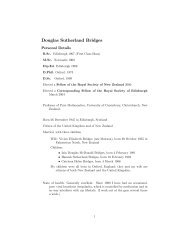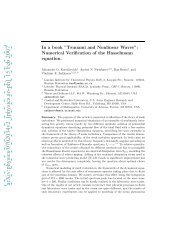OEO Office of Equal Opportunity - Department of Mathematics and ...
OEO Office of Equal Opportunity - Department of Mathematics and ...
OEO Office of Equal Opportunity - Department of Mathematics and ...
You also want an ePaper? Increase the reach of your titles
YUMPU automatically turns print PDFs into web optimized ePapers that Google loves.
236 ARTS AND SCIENCES<br />
Ph.D. in Latin American Studies<br />
The Ph.D. in Latin American Studies is designed to meet the<br />
needs <strong>of</strong> a small number <strong>of</strong> students whose career goals<br />
would be best advanced by an inter-disciplinary doctorate.<br />
Such students would include individuals who seek employment<br />
in small colleges where the ability to teach across<br />
disciplines would be an advantage <strong>and</strong> those who seek<br />
non-academic positions in fields such as museum work, international<br />
cultural exchange, diplomacy or other roles in which<br />
having skills in two disciplines, combined with Latin American<br />
area expertise, would be more useful than somewhat more<br />
extensive training within one discipline. Students primarily<br />
interested in academic employment in research institutions<br />
will generally be better served by earning a doctorate within<br />
a single discipline.<br />
Applications: In addition to the materials required by the<br />
University <strong>of</strong> New Mexico <strong>Office</strong> <strong>of</strong> Graduate Studies, the following<br />
items must be submitted directly to the Latin American<br />
Studies Program: three letters <strong>of</strong> recommendation, a letter<br />
<strong>of</strong> intent, an academic writing sample, un<strong>of</strong>ficial copies <strong>of</strong><br />
transcripts, <strong>and</strong> GRE scores.<br />
Prerequisites: A master’s degree in the intended primary<br />
concentration or in Latin American Studies with appropriate<br />
areas <strong>of</strong> concentration is required. Specific entrance<br />
requirements may vary depending on the student’s intended<br />
concentration. Each application for admission is screened by<br />
the department <strong>of</strong> the projected primary concentration before<br />
being approved by the Director <strong>of</strong> Latin American Studies.<br />
Degree Requirements<br />
The program requires a minimum <strong>of</strong> 54 hours <strong>of</strong> graduate<br />
credit work (not including dissertation) beyond the Bachelor’s<br />
degree. This work must include a primary concentration<br />
consisting <strong>of</strong> at least 30 credit hours <strong>and</strong> a secondary concentration<br />
<strong>of</strong> at least 15 credit hours. The remaining 9 credit<br />
hours may be elective credits or additional course credits in<br />
the primary or secondary concentrations. Primary concentrations<br />
include: Anthropology, Art History, Brazilian Literature<br />
& Culture, History, Political Science, Sociology, Spanish<br />
American Literature, <strong>and</strong> Spanish Linguistics. Secondary<br />
concentrations include all <strong>of</strong> the above as well as Economics<br />
<strong>and</strong> International Management. See concentration requirements<br />
listed under Ph.D. in Latin American Studies.<br />
A Committee on Studies must be formed by the end <strong>of</strong><br />
the first semester <strong>of</strong> residency <strong>and</strong> a program <strong>of</strong> studies<br />
developed <strong>and</strong> approved by the Director <strong>of</strong> Latin American<br />
Studies by the end <strong>of</strong> the second semester. The Committee<br />
on Studies will be composed <strong>of</strong> three members from the<br />
student’s primary concentration <strong>and</strong> two members from the<br />
secondary concentration. Under no circumstances will the<br />
comprehensive examinations be administered by less than<br />
the approved five-member committee.<br />
Competence is required in two languages chosen from<br />
Spanish, Portuguese, French, Haitian Creole, or Latin<br />
American indigenous languages. (Basic competence is considered<br />
the equivalent <strong>of</strong> the successful completion <strong>of</strong><br />
advanced level course work in the primary language <strong>and</strong><br />
two semesters or more <strong>of</strong> study in the second language.)<br />
Comprehensive examinations, administered by the student’s<br />
Committee on Studies, covering the primary <strong>and</strong> secondary<br />
concentrations will be given at the completion <strong>of</strong> all course<br />
work. The written exam in the primary concentration will be<br />
followed by an oral exam. General requirements for the Ph.D.<br />
are set forth in earlier pages <strong>of</strong> this catalog. Students must<br />
write <strong>and</strong> successfully defend a dissertation.<br />
Latin American Studies (LTAM)<br />
Latin American Studies is an interdisciplinary program. In<br />
addition to the courses listed below, Latin American content<br />
courses can be found under the following departmental<br />
headings: Anderson Schools <strong>of</strong> Management (International<br />
Management), Anthropology, Art History, Community <strong>and</strong><br />
Regional Planning, Economics, History, Law, Philosophy,<br />
Political Science, Portuguese, Religious Studies, Sociology,<br />
<strong>and</strong> Spanish.<br />
400. Topics in Latin American Studies. (3) ∆<br />
Will vary from instructor to instructor, but will be an in-depth<br />
analysis <strong>of</strong> special topics related to Latin America. For course<br />
content, consult the Schedule <strong>of</strong> Classes. The course may be<br />
repeated without limit provided the topics vary.<br />
497. Independent Studies. (1-3 to a maximum <strong>of</strong> 3) [1-3<br />
to a maximum <strong>of</strong> 6] ∆<br />
Prerequisite: permission <strong>of</strong> program chairperson or instructor.<br />
499. Senior Honors Thesis. (3)<br />
Prerequisite: 497. Restriction: permission <strong>of</strong> instructor.<br />
500. Topics in Latin American Studies. (3) ∆<br />
Will vary from instructor to instructor, but will be an in-depth<br />
analysis <strong>of</strong> special topics related to Latin America. For course<br />
content, consult the Schedule <strong>of</strong> Classes. The course may be<br />
repeated without limit provided the topics vary.<br />
504. Seminar in Latin American Studies. (3) ∆<br />
(Also <strong>of</strong>fered as SPAN 504, HIST 690, 688.)<br />
525. Proseminar on Latin American Politics. (3)<br />
(Also <strong>of</strong>fered as SOC 525.)<br />
551. Master’s Problems. (1-3 to a maximum <strong>of</strong> 12) [1-<br />
3] ∆<br />
Guided individual research <strong>and</strong> reading. Students may<br />
include up to 12 credit hours in their Master’s program <strong>and</strong> 6<br />
additional credit hours at the Ph.D. level.<br />
578. Latin American Development <strong>and</strong> Planning. (3)<br />
(Also <strong>of</strong>fered as SOC 508 <strong>and</strong> CRP 578.) Interdisciplinary<br />
seminar focusing on area topics in Latin American planning,<br />
development <strong>and</strong> urbanization. It is the core course for the<br />
LAS/MCRP dual-degree program.<br />
599. Master’s Thesis. (1-6)<br />
Offered on a CR/NC basis only.<br />
651. Latin American Doctoral Problems. (1-3) ∆<br />
Students may include no more than 6 credit hours in their<br />
Ph.D. program.<br />
699. Latin American Studies Dissertation. (3-12)<br />
Offered on a CR/NC basis only.<br />
LINGUISTICS<br />
Sherman E. Wilcox, Chairperson<br />
Humanities Bldg. 526<br />
MSC03 2130, Linguistics<br />
1 University <strong>of</strong> New Mexico<br />
Albuquerque, NM 87131<br />
(505) 277-6353 FAX (505) 277-6355<br />
E-MAIL: linguist@unm.edu<br />
Web site: http://www.unm.edu/~linguist<br />
Pr<strong>of</strong>essors<br />
William Cr<strong>of</strong>t, Ph.D., Stanford University<br />
Vera P. John-Steiner, Ph.D., University <strong>of</strong> Chicago<br />
Sherman E. Wilcox, Ph.D., The University <strong>of</strong> New Mexico<br />
Associate Pr<strong>of</strong>essors<br />
Melissa Axelrod, Ph.D., University <strong>of</strong> Colorado (Boulder)<br />
Larry P. Gorbet, Ph.D., University <strong>of</strong> California (San Diego)<br />
Jill P. Morford, Ph.D., University <strong>of</strong> Chicago<br />
Caroline L. Smith, Ph.D., Yale University<br />
Phyllis Perrin Wilcox, Ph.D., The University <strong>of</strong> New Mexico<br />
Assistant Pr<strong>of</strong>essors<br />
Barbara J. Shaffer, Ph.D., The University <strong>of</strong> New Mexico<br />
Catherine E. Travis, Ph.D., La Trobe University (Australia)<br />
UNM CATALOG 2006–2007 Symbols, page 611.



